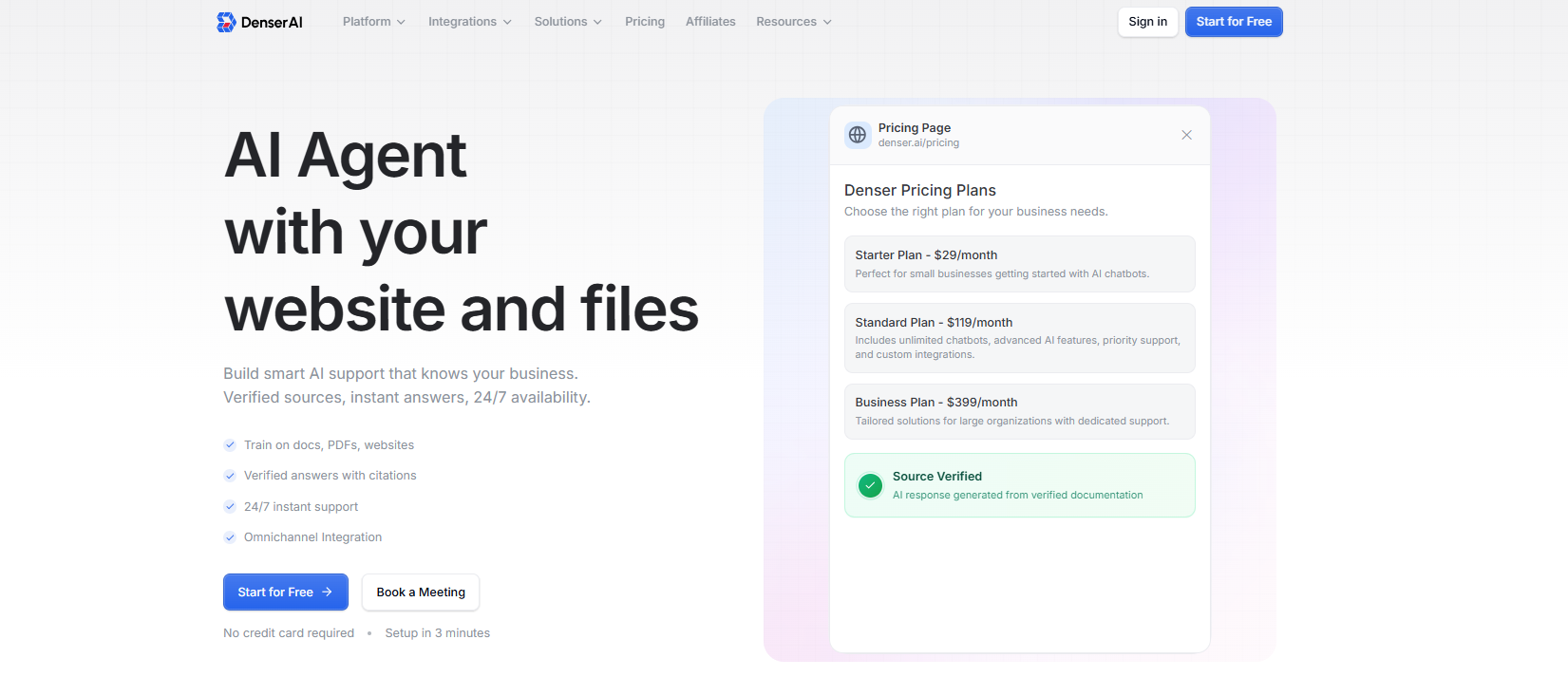
5 Best AI Chatbot Solutions With Advanced Features in 2025

AI chatbot solutions have evolved far beyond basic FAQ bots. Today's advanced platforms use RAG, NLP, and generative AI to deliver accurate, context-aware responses that transform how businesses engage with customers.
According to Juniper Research, global revenue from conversational AI services is projected to grow from $14.6 billion in 2025 to over $23 billion by 2027. This surge is driven by enterprises adopting AI chatbot solutions that go beyond simple automation to actively support workflows, qualify leads, and deliver 24/7 customer support.
Unlike traditional rule-based bots that remain static, modern AI chatbot solutions learn from every interaction—becoming smarter, more accurate, and more context-aware over time.
In this guide, we compare the 5 best AI chatbot solutions for 2025 and explore the core technologies that power them. Whether you need enterprise-grade RAG capabilities or seamless integrations, you'll find the right AI chatbot solution for your business.
Rule-Based Chatbots vs AI Chatbot Solutions: Which Should You Choose?#
Rule-based chatbots have long been the entry point for businesses looking to automate conversations. They work on scripts and decision trees, offering quick responses to predictable questions like order status or opening hours.
However, these traditional bots hit a wall when conversations move off-script. They can't handle unexpected queries, understand context, or deliver the human-like responses customers now expect.
The Hidden Cost of Rule-Based Bots#
Maintenance is the silent killer of rule-based chatbots. Every process change requires manual updates. Every new product needs new rules. Over time, the effort to keep these bots current outweighs the value they provide—especially as your business grows and conversations become more complex.
Teams find themselves needing specialized technical skills just to maintain basic functionality, which increases costs and slows down scalability.
Why AI Chatbot Solutions Win#
AI chatbot solutions overcome these limitations by design:
- Natural language understanding: Analyze context and intent, not just keywords
- Continuous learning: Improve accuracy with every interaction
- Lower maintenance: Adapt to new information without manual rule updates
- Scalable conversations: Handle complex, multi-turn dialogues effortlessly
If your goal is to reduce operational strain and future-proof your customer communication strategy, an AI chatbot solution is the sustainable, effective choice.
5 Best AI Chatbot Solutions in 2025#
Investing in the right AI chatbot solution creates a resource that continuously delivers value across customer support, sales, and internal operations. Here are the five leading AI chatbot solutions worth considering for enterprise and business deployments:
1. Denser#
Denser is an enterprise-grade AI agent platform built to let you create custom chatbots and train AI on your own documents, websites, and files.
It supports retrieval-augmented generation (RAG), where the bot can pull facts from your content to answer accurately and reduce hallucinations.

The platform also offers omnichannel integration and 24/7 availability to engage customers anytime. It acts as an AI agent that can process human language, recognize customer intent, and deliver human-like responses.
Denser stands out for its focus on source-grounded responses and enterprise security. A source citation for transparency can accompany every answer the bot gives. It scales to handle large knowledge bases by supporting thousands of webpages or documents.
It has a built-in DenserRetriever component that specializes in high-accuracy information retrieval. The chatbot references the information from your data. Denser also offers tools and APIs to customize behavior and integrate with your data sources.
If you need advanced control, Denser offers private cloud deployments and an API that reflects its enterprise-oriented design. Request a product demo or sign up for a free trial today!
2. ChatGPT#
ChatGPT is a conversational AI by OpenAI that can simulate human conversation. It can carry on multi-turn dialogues, remember context, and follow detailed instructions.
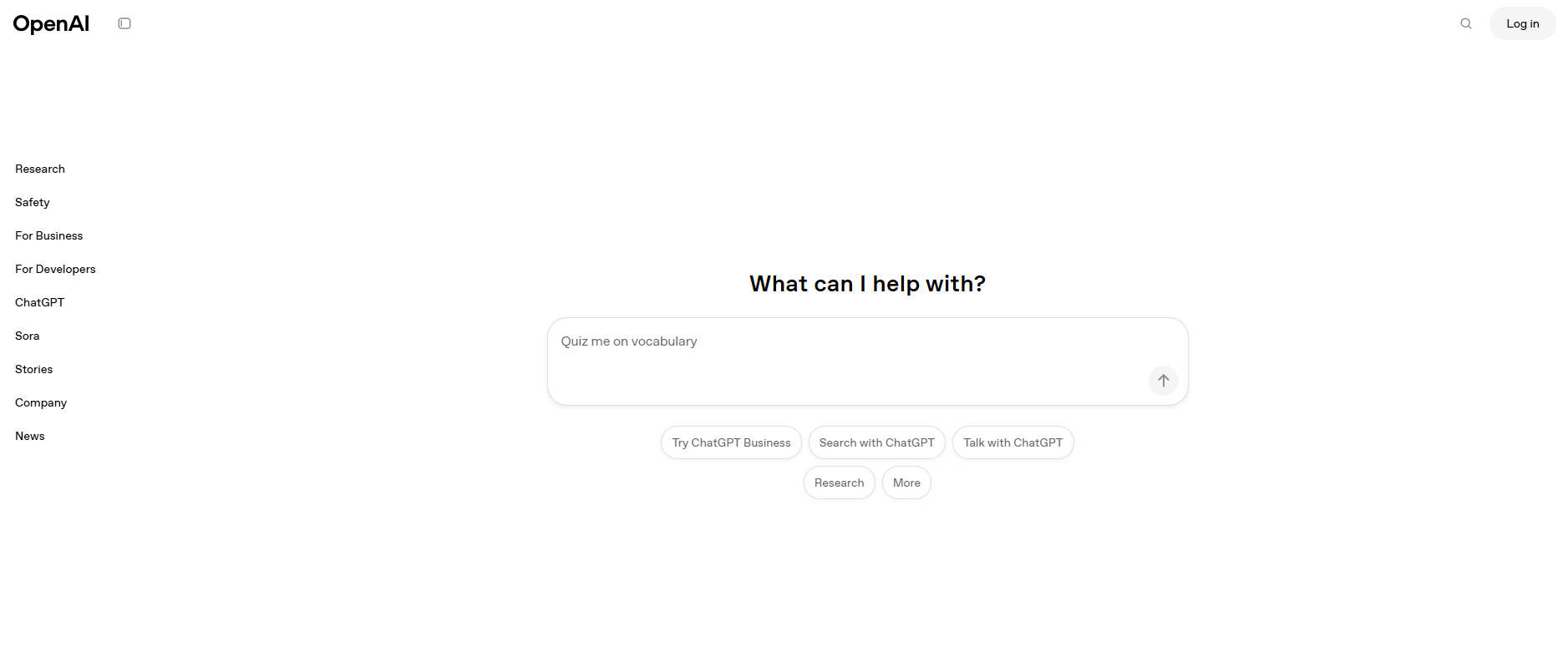
Image Source: openai.com
ChatGPT’s latest versions are multimodal, as they can handle text, analyze images, and generate visuals or voice responses.
OpenAI offers ChatGPT Enterprise, which provides enterprise-grade security, unlimited high-speed use of the most powerful models (GPT-4/5), and data analysis tools.
The standard ChatGPT (free or Plus) is integrated with tools like web browsing for real-time information and code execution. You can also upload and summarize documents, write and execute code, connect to the internet for research, and use plugins or APIs to perform actions.
However, ChatGPT can sometimes produce incorrect or inconsistent answers, especially on niche or recent topics. Users report that it may give the wrong info or misunderstand questions, which may require human intervention in sensitive cases.
Many have also found the usage caps and lack of certain features on the free plan frustrating, which nudges users towards the paid tiers.
Some users note that the interface could improve, as it lacks an easy search through past chat history. At times, it also struggles to deliver reliable real-time assistance during heavy usage.
3. Claude#
Claude is an AI chatbot developed by Anthropic, which functions as an assistant for tasks ranging from Q&A to coding. It can ingest and analyze up to 100,000 tokens in one prompt, which is used for processing long documents or lengthy discussions.
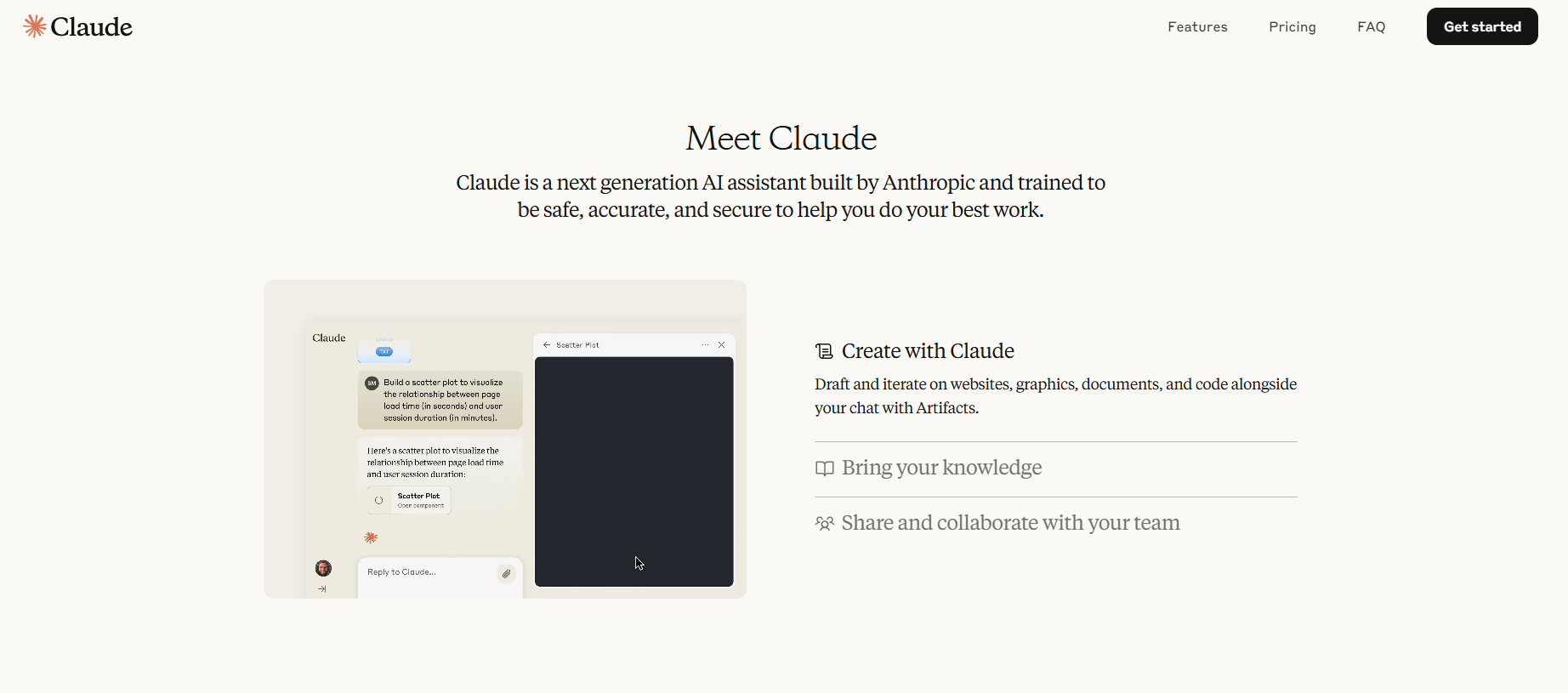
Image Source: claude.ai
The assistant is also built with a focus on harmlessness. Anthropic trained Claude with techniques to reduce toxic or inappropriate outputs.
It also introduced the “Memory” feature for teams, where Claude can remember details about your organization’s projects and preferences over long periods.
But, Claude is only available in certain regions, and some users outside supported areas might need workarounds. In terms of performance, users have observed that it can still make mistakes or produce incorrect answers on specialized queries.
4. Google Gemini#
Google Gemini is an AI platform that represents Google’s latest generation of language models, integrating capabilities from Google’s DeepMind research. It's a multimodal AI assistant that can understand and generate text, interpret images, and produce or edit visuals and audio.
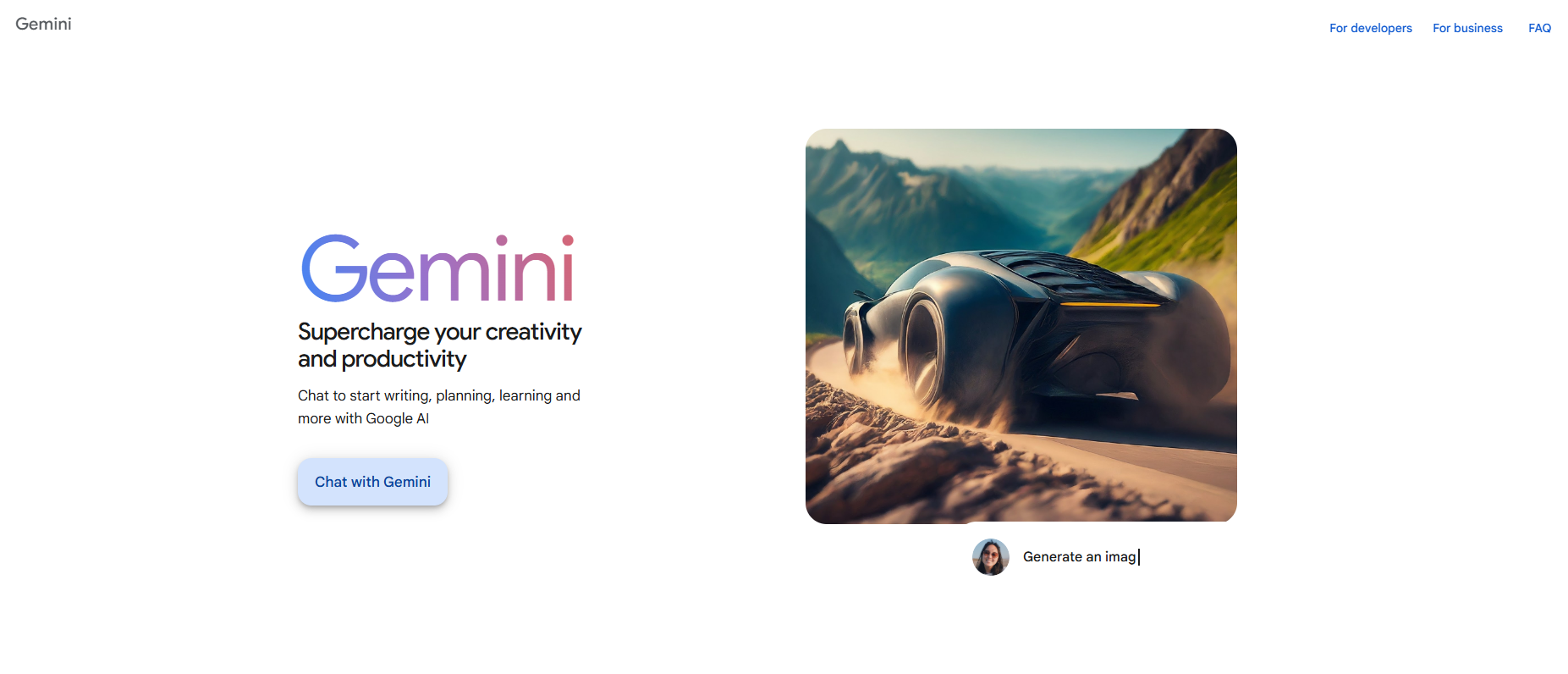
Image Source: gemini.google.com
The platform also supports image creation and editing. With the Gemini 2.5 Flash Image model, you can blend images or create new ones from text prompts.
Gemini is integrated into Google’s ecosystem as it powers the new Google Assistant, supporting AI-powered interaction for consumers and businesses.
As a Google product, it comes with enterprise-level security options and data compliance. Early enterprise testers note that Gemini’s model is used in reasoning and coding. It offers connectors for business data and can write complex code or formulas when asked.
Another drawback noted by users is that Gemini can sometimes get things wrong. Google itself cautions that it might not always get it right and encourages using the double-check button for important facts.
5. Microsoft Copilot#
Microsoft Copilot is an AI solution woven into the Microsoft 365 ecosystem. It acts as a personal AI assistant within tools like Word, Excel, PowerPoint, Outlook, Teams, and more.
Copilot can draft documents or emails based on a brief prompt, generate meeting summaries in Teams, create PowerPoint presentations from an outline, or analyze Excel data and produce insights.
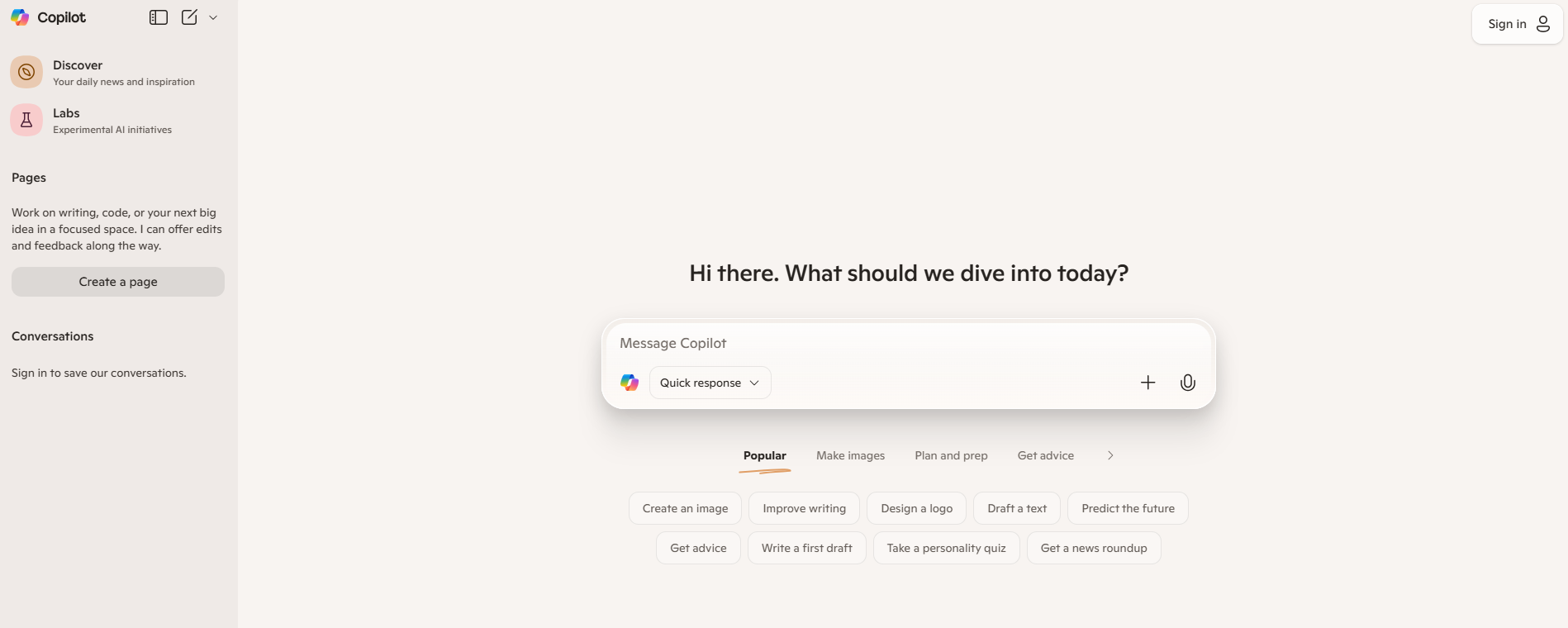
Image Source: copilot.microsoft.com
In Teams chat or Outlook, you can ask Copilot questions about your internal documents, and it will answer with context drawn from those files.
Copilot also includes an AI-powered enterprise search that can retrieve information from your SharePoint, OneDrive, and emails when you ask a question.
Copilot’s Agents and Studio provide ready-to-use agents and a Copilot Studio where developers or power users can build custom AI agents integrated with business processes.
The primary drawbacks of Microsoft Copilot relate to cost and learning curve. Copilot comes at a premium price and has been quoted at around $20 per user per month for Pro customers.
Copilot is generally accurate when grounded in your data, but a few users noted that it can occasionally produce suggestions that are irrelevant or need adjustment.
Key Technologies Powering AI Chatbot Solutions#
Understanding the core technologies behind AI chatbot solutions helps you evaluate platforms and set realistic expectations. Here's what powers today's most effective AI chatbot solutions:
Natural Language Processing (NLP)#
NLP is the foundation of every effective AI chatbot solution. It enables chatbots to analyze user input with context and nuance—understanding intent, not just keywords.
NLP powers AI chatbot solutions to:
- Identify user intent across varied phrasing
- Sustain coherent multi-turn dialogues
- Support multilingual conversations
- Handle industry-specific terminology
- Drive stronger customer engagement across channels
Machine Learning (ML)#
Machine learning allows AI chatbot solutions to improve continuously. These systems learn from past interactions, adjusting responses based on patterns in customer data.
The more conversations processed, the better they become at predicting user behavior, reducing errors, and delivering relevant answers. ML enables AI chatbot solutions to handle complex queries that would break rule-based systems.
Retrieval-Augmented Generation (RAG)#
RAG is the technology that separates accurate AI chatbot solutions from those that hallucinate. Instead of generating answers purely from training data, RAG-powered chatbots retrieve relevant information from your actual documents, knowledge bases, and systems—then generate responses grounded in that verified data.
This approach delivers:
- Higher accuracy: Answers backed by your real information
- Source citations: Users can verify where answers came from
- Reduced hallucinations: No more made-up responses
Generative AI#
Generative AI powers AI chatbot solutions to create dynamic, contextually relevant responses instead of drawing from scripts. Large language models (LLMs) process input and generate replies that adapt to phrasing, tone, and intent—creating interactions that feel genuinely conversational.
Beyond dialogue, generative AI enables chatbots to draft content, summarize documents, and support decision-making across your tech stack.
Sentiment Analysis#
Sentiment analysis allows AI chatbot solutions to detect emotional tone behind user input—frustration, satisfaction, urgency, or confusion. This awareness enables:
- Adaptive responses based on customer mood
- Automatic escalation for frustrated customers
- Priority routing for high-urgency issues
- Insights into overall customer sentiment trends
Use Cases for AI Chatbot Solutions#
AI chatbot solutions are deployed across industries to automate conversations, reduce costs, and improve customer experiences. Here are the most impactful use cases where businesses implement AI chatbot solutions:
Customer Support Chatbots#
AI customer support chatbots act as a frontline filter for routine questions. These bots can handle the basics reliably, leaving the support team with more time to focus on cases that need human judgment.
Customer service chatbots are also effective at managing busy periods. When your business runs a campaign or sees seasonal demand, incoming questions can quickly overwhelm a small team.
A conversational AI chatbot can respond to many queries at once, easing pressure on the queue and helping customers get timely answers across multiple channels.
Consistency is another area where customer support chatbots add value. Every customer gets the same accurate explanation of a return policy or troubleshooting step.
An AI customer service chatbot reduces the chance of conflicting information and helps maintain exceptional customer service standards.
Sales & Lead Generation Chatbots#
Lead generation chatbots are designed to start conversations with potential customers when interest is highest. These bots can greet prospects on a website, ask qualifying questions, and guide them toward the next step.
Through short, structured prompts, chatbots filter and score leads before they reach the sales team. This keeps pipelines cleaner and allows reps to invest time in the prospects most likely to convert, while providing more personalized customer service.
Beyond filtering, AI sales chatbots can also nurture the buying journey. They recommend products, share tailored resources such as case studies, or offer to schedule demos.
When a chatbot is integrated with CRM, all the data flows to sales teams, which gives them context for a smoother handoff and helps to improve customer service outcomes.
Ecommerce Chatbots#
Ecommerce chatbots help bridge the gap between browsing and buying. These AI bots can guide customers through product searches or clarify shipping details to improve the customer experience.
These chatbots use browsing patterns, past purchases, and user behavior to suggest relevant products. The experience feels more tailored, while your online store can benefit from increased opportunities for cross-selling and upselling.
Ecommerce AI agents can confirm orders, track shipments, and manage return or refund requests. Many systems also integrate with messaging apps and Facebook Messenger to reach across mobile apps that customers already use.
Healthcare Chatbots#
An AI chatbot for healthcare reduces the load on administrative staff and makes access to care more convenient for patients.
They provide initial assessments by asking patients about their symptoms and suggesting possible next steps, such as scheduling a consultation or seeking urgent care.
While not a substitute for medical advice, they help patients decide how quickly they should act and which channel of care is most appropriate.
AI agents for healthcare also remind patients to take medications, share recovery tips, or provide updates on lab results through secure integrations with health record systems.
Financial Services Chatbots#
Financial services chatbots give customers quick access to information like account balances, recent transactions, or payment due dates. With proper authentication, they simplify routine transactions while ensuring response accuracy and reducing errors.
AI is used in fintech to flag unusual activity and send real-time alerts. Customers can confirm whether a transaction is legitimate or report it as suspicious. It also adds a proactive layer of fraud prevention while keeping users engaged in protecting their accounts.
Recommended Reading:#
10 AI Use Cases in Financial Services You Need to Know#
Internal Business Chatbots#
Internal chatbots can assist staff in checking schedules, submitting HR requests, or finding internal documents without needing to email or call another department.
They can also serve as a searchable hub for company knowledge. Employees can ask questions about processes, compliance guidelines, or training materials and receive quick, consistent answers.
Information is easier to find and eliminates the reliance on siloed knowledge within teams.
Why Denser Is the Best AI Chatbot Solution for Enterprise#
Many AI chatbot solutions focus on simple conversations, but Denser takes a fundamentally different approach—delivering enterprise-grade accuracy with transparent, verifiable responses.
Answer Accuracy with Source Citations#
Unlike AI chatbot solutions that guess or hallucinate, Denser provides verifiable answers with source citations. Every response links back to the specific document, webpage, or knowledge base article it came from. This transparency builds trust and eliminates the misinformation risk that plagues many AI chatbot solutions.
Hybrid Retrieval with DenserRetriever#
Denser's hybrid retrieval engine combines keyword search, vector search, and ML-powered reranking to maximize accuracy. Each query matches not just language but context and meaning.
For organizations managing large knowledge libraries, this means chatbots that sift through thousands of documents and surface the most relevant information—every time.
Document-Powered Knowledge#
Denser transforms static content into interactive, searchable knowledge bases. With support for Word files, Excel sheets, PowerPoint slides, and PDF chat, you can turn existing documents—reports, policy guides, product catalogs—into assets your AI chatbot solution can reference accurately.
Enterprise-Ready RAG#
Built for retrieval-augmented generation, Denser connects precise search with generative AI flexibility. Every response is grounded in your actual data, not training data hallucinations. Scale from small document collections to enterprise-wide knowledge bases without accuracy loss.
Flexible Pricing That Scales#
Start with a free trial, then choose a plan matching your usage. Small teams get affordable entry points; enterprises gain flexibility to expand without disruption or per-conversation surprises.
Get Started with the Best AI Chatbot Solution Today#
Most AI chatbot solutions can hold simple conversations. Few deliver the accuracy, transparency, and scalability that enterprise deployment demands.
Denser combines hybrid retrieval, RAG-powered accuracy, and source-cited answers to ensure every interaction is trustworthy and verifiable. It's an AI chatbot solution that learns from your data, adapts to your workflows, and scales with your business.
What you get with Denser:
- Source-cited answers that users can verify
- RAG-powered accuracy grounded in your actual data
- No-code deployment in minutes
- 80+ language support for global reach
- Enterprise security with SOC 2 compliance
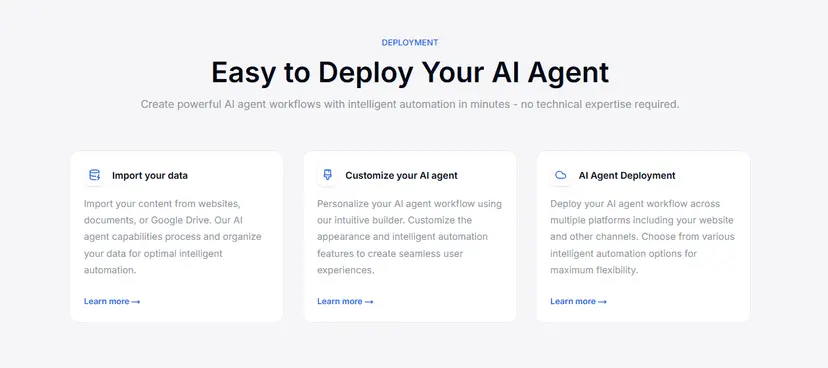
Ready to see why leading enterprises choose Denser over other AI chatbot solutions? Request a product demo or sign up for a free trial today!
FAQs About AI Chatbot Solutions#
What technologies power AI chatbot solutions?#
AI chatbot solutions combine several core technologies:
- Natural Language Processing (NLP): Understands user intent and context
- Machine Learning (ML): Enables continuous improvement from interactions
- Retrieval-Augmented Generation (RAG): Grounds responses in your actual data
- Generative AI/LLMs: Creates dynamic, conversational responses
- Sentiment Analysis: Detects emotional tone for adaptive responses
The most effective AI chatbot solutions integrate all five, with RAG being the key differentiator for accuracy.
What is the best AI chatbot solution for business?#
The best AI chatbot solution depends on your specific needs, but Denser consistently ranks among top choices for enterprises prioritizing accuracy and transparency. It combines:
- RAG-powered responses with source citations
- Hybrid retrieval for maximum accuracy
- No-code deployment and enterprise security
- Integrations with CRM, helpdesk, and business tools
For businesses needing customization, analytics, and verifiable answers, Denser delivers superior results compared to general-purpose AI chatbot solutions.
How do AI chatbot solutions differ from ChatGPT?#
ChatGPT is a powerful general-purpose LLM, but it's not a complete AI chatbot solution for business. Key differences:
| Feature | ChatGPT | AI Chatbot Solutions (e.g., Denser) |
|---|---|---|
| Source citations | No | Yes |
| Your data integration | Limited | Full RAG support |
| Business integrations | Via plugins | Native CRM/helpdesk |
| Enterprise security | Basic | SOC 2, GDPR compliant |
| Analytics | Minimal | Comprehensive |
Purpose-built AI chatbot solutions like Denser combine LLM capabilities with enterprise infrastructure for business deployments.
How much do AI chatbot solutions cost?#
AI chatbot solution pricing varies by platform and scale:
- Free tiers: Most platforms offer limited free trials
- Starter plans: $20-100/month for small teams
- Professional plans: $100-400/month for growing businesses
- Enterprise: Custom pricing for large deployments
Denser offers plans from free to $399/month, with enterprise options for organizations needing custom solutions and dedicated support.
Related Reading#
- Best AI Chatbot Solutions for Business — Our comprehensive guide comparing the best AI chatbot solutions in 2026.
- Top AI Chatbot Solution Providers — Compare 10 leading chatbot vendors by features, pricing, and enterprise readiness.
- Enterprise Chatbot Solution Types — Explore different chatbot types and implementation strategies for enterprise.
What makes an AI chatbot solution "enterprise-grade"?#
Enterprise-grade AI chatbot solutions include:
- Security certifications: SOC 2, ISO 27001, GDPR/HIPAA compliance
- Scalability: Handle thousands of concurrent conversations
- RAG capabilities: Ground responses in verified business data
- Source citations: Transparency for audit and verification
- System integrations: Connect to CRM, ERP, helpdesk tools
- Analytics: Comprehensive metrics and optimization tools
- SLA guarantees: Uptime and support commitments